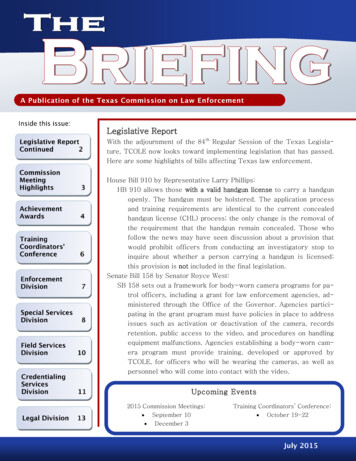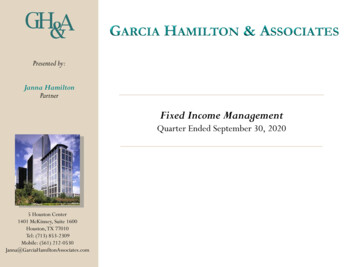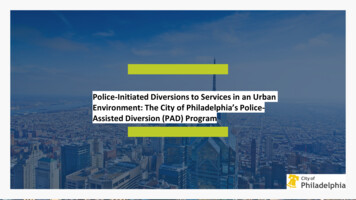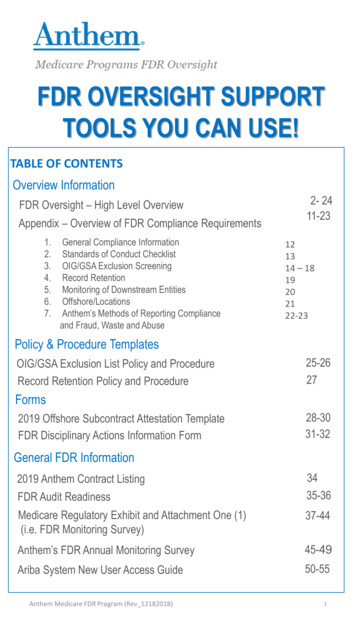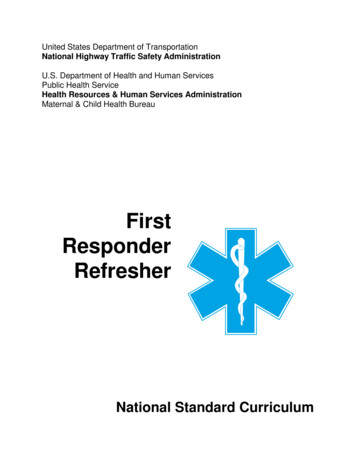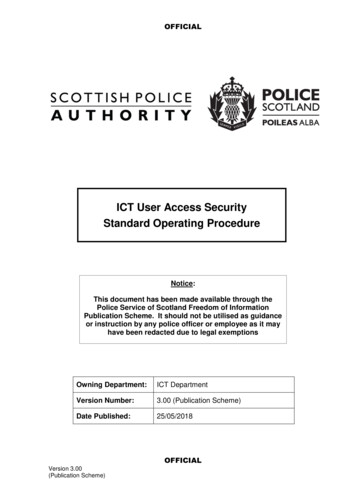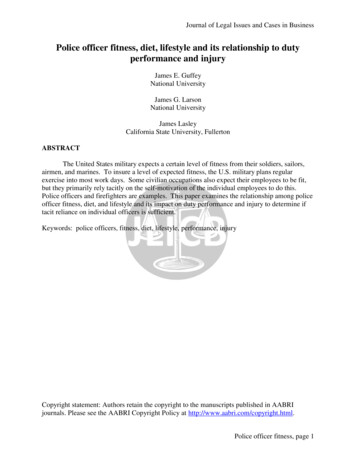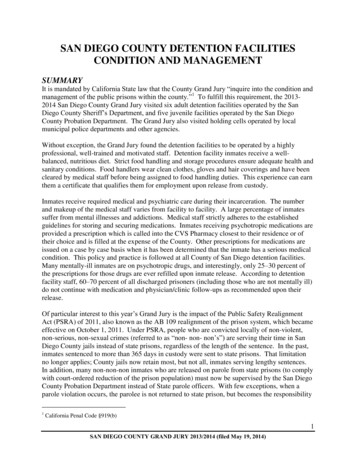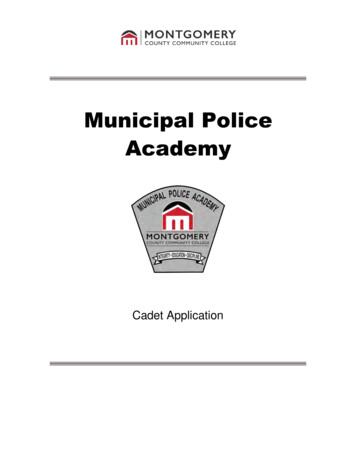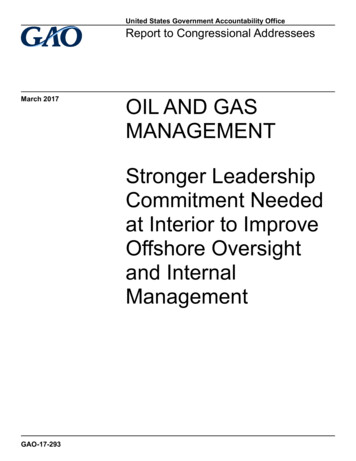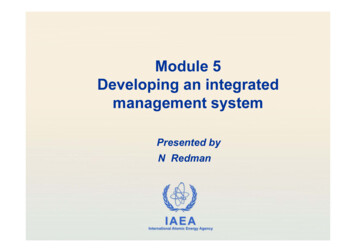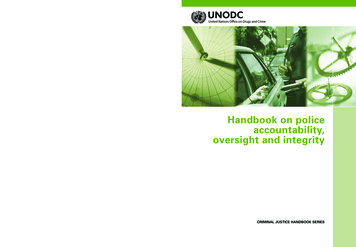
Transcription
Vienna International Centre, PO Box 500, 1400 Vienna, AustriaTel: ( 43-1) 26060-0, Fax: ( 43-1) 26060-5866, www.unodc.orgHandbook on police accountability, oversight and integrityUnited Nations publicationPrinted in AustriaSales No. E.11.IV.5*1057991*V.10-57991—July 2011—1,070USD 28ISBN 978-92-1-130307-0CRIMINAL JUSTICE HANDBOOK SERIES
Cover images: Left and right: Photodisc.com, Centre: iStockphoto.com/theprint
UNITED NATIONS OFFICE ON DRUGS AND CRIMEViennaHandbook on police accountability,oversight and integrityCRIMINAL JUSTICE HANDBOOK SERIESUNITED NATIONSNew York, 2011
UNITED NATIONS PUBLICATIONSales No. E.11.IV.5ISBN 978-92-1-130307-0eISBN 978-92-1-055037-6 United Nations, July 2011. All rights reserved.The designations employed and the presentation of material in this publication do notimply the expression of any opinion whatsoever on the part of the Secretariat of theUnited Nations concerning the legal status of any country, territory, city or area, or ofits authorities, or concerning the delimitation of its frontiers or boundaries.Requests for permission to reproduce this work are welcomed and should be sent to theSecretary of the Publications Board, United Nations Headquarters, New York, N.Y.10017, U.S.A. or also see the website of the Board: https://unp.un.org/Rights.aspx.Governments and their institutions may reproduce this work without prior authorizationbut are requested to mention the source and inform the United Nations of suchreproduction.Publishing production: English, Publishing and Library Section, United Nations Officeat Vienna.ii
AcknowledgementsThe United Nations Office on Drugs and Crime (UNODC) would like to express itsgratitude to Anneke Osse, a consultant based in the Netherlands, who prepared thefinal text of this Handbook on Police Accountability, Oversight and Integrity, and to GrahamDossett, a consultant based in the United Kingdom, who provided the initial draft forthe Handbook.UNODC also wishes to acknowledge the valuable contributions received from expertsfrom a range of backgrounds, including police officers, members of independent oversight bodies, international consultants, human rights activists and academics, inparticular:Pierre Aepli, Etannibi Alemika, Josef Roy Benedict, Mick Beyers, Tom Davies, QuirineEijkman, Hugo Frühling, Emma Gardner, Roger Gaspar, Cecil Griffiths, Martin Hardy,Kees Hindriks, Lilian Mahiri, Walter McKay, Swati Mehta, Edgar Mohar, Rachel Neild,Gillian Nevins, Sergei Nikitin, Vivienne O’Connor, Tim Parritt, Sanjay Patil, KathrinQuesada, John Ralston, Lauri Sivonen, Everett Summerfield, Sean Tait, Daniel DeTorres, Lars van Troost and Tommy Tshabalala.The following UNODC staff also contributed to the Handbook throughout its development: Estela Maris Deon, Anna Giudice Saget, Ajit Joy, Erik Larson, PierreLapaque, Valérie Lebaux, Danielle Murdoch, Nivio Nascimento, Emanuele Pitto,Venkata Rama Sastry, Mark Shaw, Mia Spolander, Oliver Stolpe, Arnaud Tasciyan,Sandra Valle and Dimitri Vlassis.iii
SummaryFor the purposes of the present Handbook, accountability is defined as a system of internal and external checks and balances aimed at ensuring that police carry out theirduties properly and are held responsible if they fail to do so. Such a system is meant touphold police integrity and deter misconduct and to restore or enhance public confidence in policing. Police integrity refers to normative and other safeguards thatkeep police from misusing their powers and abusing their rights and privileges.For the police to be able to take responsibility for actions and wrongdoings, they needto receive proper direction. They also need to be well-prepared and equipped to carryout their functions in a professional way, and need to be assured of proper workingconditions. Line managers must supervise their staff, and police actions and operationsneed to be reviewed and evaluated. Moreover, effective accountability requires a propercomplaints system that is easily accessible to the public and that can effectively investigateallegations and recommend disciplinary sanctions or refer cases for criminal prosecution.It should also be able to make recommendations that target the underlying causes ofmisconduct.Effective police accountability involves many different actors representing the differentlayers of modern-day democracies, including government representatives, the parliament, the judiciary, civil society actors and independent oversight bodies such asnational human rights institutions. Primarily, it involves the police themselves.Key elements of an effective police accountability system include:"" Legislation (in line with international human rights law) specifying the functions and powers of the police"" Practical instructions based on the legislation that reflect both the spirit andthe letter of the law"" Opportunities for the public to voice their concerns"" Policies that set priorities on how to deploy police capacity"" Adequate police training, both basic and ongoing"" Equipment that is adequate for prescribed police functions"" Proper reporting procedures and facilities"" Adequate supervision that supports officers in carrying out their duties professionally and reporting these correctly"" A working culture that promotes transparency and evaluation"" Monitoring of police actions and operations by both police leadership andexternal organs"" Complaints procedures, both for making complaints to the police directly andto independent bodies"" Fair and effective procedures and policies on how to deal with misconduct,including both disciplinary and criminal codes, adequate investigative capacity,procedures for punishment and appeal proceduresiv
"" An independent body to oversee such procedures"" Scrutiny and oversight involving feedback to the police in order to improvefuture activities and prevent future wrongdoings"" Evaluation and complaints procedures that contribute to the development ofnew policies, procedures and instructions"" Reliable statistics on police performance, related both to effectiveness in dealing with crime and public order, as well as to their integrity and publicconfidence"" Procedures for overseeing the feedback, evaluation and complaints proceduresand statisticsv
ContentsPageAcknowledgements . . . . . . . . . . . . . . . . . . . . . . . . . . . . . . . . . . . . . . . . .iiiSummary . . . . . . . . . . . . . . . . . . . . . . . . . . . . . . . . . . . . . . . . . . . . .ivIntroduction . . . . . . . . . . . . . . . . . . . . . . . . . . . . . . . . . . . . . . . . . . . . .1Chapter 1. A comprehensive structure for effective police .accountability . . . . . . . . . . . . . . . . . . . . . . . . . . . . . . . . . .5Chapter 2. Obligations and responsibilities under international legalstandards . . . . . . . . . . . . . . . . . . . . . . . . . . . . . . . . . . . . . .21Chapter 3. Dealing with complaints against the police . . . . . . . . . . .33Chapter 4. Before and after police actions and operations: .establishing independent police oversight and .complaints bodies . . . . . . . . . . . . . . . . . . . . . . . . . . . . . . .49Chapter 5. Before, during and after police actions and operations:strengthening internal accountability and promoting .police integrity . . . . . . . . . . . . . . . . . . . . . . . . . . . . . . . . .75Chapter 6. Before and after police operations and actions: .strengthening accountability to the State . . . . . . . . . . . .93Chapter 7. Before police operations and actions: .engaging the public—the role of civil society . . . . . . . . . .101Chapter 8. Road map for effective accountability and .promotion of integrity . . . . . . . . . . . . . . . . . . . . . . . . . . . .111AnnexesI. An overview of international instruments relevant to policing . .117II. International Code of Conduct for Public Officials. . . . . . . . . . .119III. International Criminal Police Organization (INTERPOL) .standards. . . . . . . . . . . . . . . . . . . . . . . . . . . . . . . . . . . . . . . . . . . .121Bibliography . . . . . . . . . . . . . . . . . . . . . . . . . . . . . . . . . . . . . . . . . . . . .131vii
IntroductionLaw enforcement institutions are entrusted with a diverse set of tasks requiring a highdegree of integrity within police agencies and their oversight. Where this does not function well, law enforcement officers may become vulnerable to acting unlawfully andoutside their remit. In post-conflict societies in particular, but also in many non-conflictsituations, police reform interventions are much needed, often in the form of retrainingfor police officers with a particular focus on human rights principles. In addition, alonger-term effort is required to establish a framework for police oversight and accountability in order to strengthen integrity within systems of policing.1Efforts to enhance police oversight and accountability must focus on three key, relatedpriorities. Firstly, where policing has been militarized2 and may be undemocratic andauthoritarian, efforts must be made to enhance civilian control over the police. Secondly, it is necessary to increase public confidence in the police by upgrading levels ofpolice service delivery as well as by investigating and acting in cases of police misconduct. Finally, reducing corruption within the police is crucial.The present Handbook is one of the practical tools developed by UNODC to supportcountries in the implementation of the rule of law and the development of criminaljustice reform. It aims to assist countries in their efforts to develop effective systems ofoversight and accountability within their law enforcement authorities and enhancepolice integrity, and it addresses issues including:"" Enhancement of police integrity and the integrity of policing1William G. O’Neill, Police Reform and Human Rights: A HURIST Document (New York, Joint Human RightsStrengthening Programme of the United Nations Development Programme and the Office of the High Commissioner for Human Rights (HURIST), 2004). In the past decade, a number of publications have been released collating the main lessons learned in relation to police reform in post-conflict situations but also as a component ofconflict prevention strategies. See for example David H. Bayley, Democratizing the Police Abroad: What to Do andHow to Do It, Issues in International Crime (Washington, D.C., United States of America, Department of Justice,National Institute of Justice, June 2001), available from www.ncjrs.gov/pdffiles1/nij/188742.pdf; Otwin Marenin,Restoring Policing Systems in Conflict Torn Nations: Process, Problems, Prospects, Occasional Paper, No. 7 (Geneva,Geneva Centre for the Democratic Control of Armed Forces, June 2005), available from www.ssrnetwork.net/document conflict-torn-nations-processes-problems-prospects and William G. O’Neill, “Police reform in post-conflict societies: what we know and what we still need to know”, Policypaper (New York, International Peace Academy, 2005). Available from lice reform in post-conflict societies.pdf.2That is, military in style, culture and operations and sometimes in fact, when the police have been part ofthe military.1
2Handbook on police accountability, oversight and integrity"" Dealing stigationand"" Setting policing priorities and encouraging policy input, including from outside the police"" “Inviting” external review, including from independent actorsThe key players in enhancing police accountability are police officers themselves, as theprime bearers of responsibility for the integrity of the police force. The next most important players are independent police oversight bodies. Other State institutions, mostnotably the Ministry of the Interior,3 and civil society, are also of crucial importance.The present Handbook aims to describe an integrated approach to installing an effectivepolice accountability system, including both preventive and corrective measures, and toexplain the role and functions of the different actors in this system.Target audience of the HandbookThe intended users of the present Handbook are policymakers and those working at thestrategic or management level in police agencies. Parliamentarians and civil societyorganizations engaged in activities related to improving police accountability, integrityand civilian police oversight may also find it useful.Overview of chaptersChapter I gives an overview of the principles relevant to democratic policing. The keyto restoring or enhancing public confidence in the police is openness to external reviewand oversight. Achieving public confidence is crucial to effective policing. The chapterpresents a structure for developing, analysing and implementing an effective policeaccountability system.A core principle of police accountability is that the police should be accountable to thelaw. Chapter II gives an overview of the most relevant international standards related topolicing and police accountability.While police accountability is not restricted to dealing with complaints, an effectivecomplaints system is key to ensuring accountability. Chapter III looks at the complaintssystem, discussing the general principles for dealing with complaints, applicable both tothe police and independent police complaints bodies.Independent bodies are discussed in chapter IV, which presents a list of the factors thatpromote the impact and effectiveness of these bodies. Examples of independent policeoversight and complaints bodies, with different mandates and operating in differentlegal systems, are also provided.3While the name of the ministry responsible for the police varies from country to country—examples includeHome Office, Ministry of Security and Ministry of Police Affairs—the functions in relation to the police are usuallysimilar. Additionally, any gendarmerie usually reports to the Ministry of Defence. In the present Handbook, “Ministryof the Interior” will be used.
3INTRODUCTIONThe police themselves are the key players in maintaining or restoring police integrity.Chapter V elaborates on their role, with a particular emphasis on managers. The chapter also views the range of instruments that police have at their disposal to strengtheninternal accountability and preserve integrity.Police accountability is not limited to the police and the independent police bodies. Thevarious institutions that can be considered to constitute the State each play a distinctrole, as discussed in chapter VI. The role of the public, not just as “clients” who need tobe able to share their concerns, but also in sharing responsibility for fair and effectivepolicing, is examined in chapter VII.Finally, chapter VIII provides a road map meant as a practical tool for policymakers andpolice seeking to develop, restore or enhance an effective police accountability system.
I.A.A comprehensive structurefor effective policeaccountabilityDemocratic policing: key conceptsThe mechanisms established by States to protect people’s rights, establish and maintainorder and guarantee stability and security are usually referred to collectively as the securitysector.4 An important actor in the security sector is the police, whose functions, as a minimum, are:5"" Prevention and detection of crime"" Maintenance of public order"" Provision of assistance to the publicIn order to carry out these functions, the police have certain powers, namely the power toarrest and detain and the power to use force. It is precisely this monopoly on the use offorce6 and the power to arrest and detain that place the police in a unique and sensitiveposition within the democratic State, so that adequate control mechanisms are requiredto ensure that these powers are consistently used in the public interest.7 Like any otherpublic service, the police must operate with impartiality.4It is generally agreed that the security sector includes “core security actors (e.g. armed forces, police, gendarmerie, border guards, customs and immigration, and intelligence and security services); security management andoversight bodies (e.g. ministries of defence and internal affairs, financial management bodies and public complaintscommissions); justice and law enforcement institutions (e.g. the judiciary, prisons, prosecution services, traditionaljustice systems); and non-statutory security forces (e.g. private security companies, guerrilla armies and privatemilitia).” (Organisation for Economic Co-operation and Development, OECD DAC Handbook on Security SystemReform: Supporting Security and Justice (Paris, 2007), p. 5). Available from www.oecd.org/dataoecd/43/25/38406485.pdf. A similar definition is given in the report of the Secretary-General on securing peace and development: therole of the United Nations in supporting security sector reform (A/62/659-S/2008/39).5See for example: Council of Europe, Recommendation Rec(2001)10 of the Committee of Ministers to memberStates on the European Code of Police Ethics, adopted by the Committee of Ministers on 19 September 2001; Ceesde Rover, To Serve and to Protect: Human Rights and Humanitarian Law for Police and Security Forces (Geneva, International Committee of the Red Cross, 1998); Ralph Crawshaw, Barry Devlin and Tom Williamson, Human Rights andPolicing: Standards for Good Behaviour and a Strategy for Change (The Hague, Kluwer Law International, 1998). TheEuropean Code of Police Ethics is available from https://wcd.coe.int/wcd/ViewDoc.jsp?id 223251&Site CM.6In most countries, the police are the only State body that may legally use force to maintain order (in timesof peace). Others are allowed to use force only in self-defence. This is referred to as a police monopoly on the useof force in times of peace.7The notion that the State and all its institutions are to serve the public interest is reflected in article 1 of theInternational Code of Conduct for Public Officials (General Assembly resolution 51/59, annex) which states: “Apublic office, as defined by national law, is a position of trust, implying a duty to act in the public interest. Therefore,the ultimate loyalty of public officials shall be to the public interests of their country as expressed through thedemocratic institutions of government.” The International Code of Conduct for Public Officials is recommended toMember States “as a tool to guide their efforts against corruption”. See annex II.5
6Handbook on police accountability, oversight and integrityThe description of the police as the strong arm of the State reflects their authorizationto enforce laws and policies defined by State institutions. In some countries, this leadsto State representatives trying to influence the police to serve their interests rather thanthe public interest (known as political interference).8 Others therefore prefer to regardthe police as a service to the public, with the emphasis on the requirement for the policeto be responsive to the people’s needs, given that they are carrying out their functionson the people’s behalf. However, it may be difficult to define the people and their needsbecause in many countries, different social groups may have different expectationsabout how the police should respond to certain situations.Neither acting exclusively on the instructions of State representatives nor simply honouring public requests will ensure policing in the public interest. To enable impartiality, including political impartiality, and non-arbitrary professional decision-making—in particular with regard to the use of police powers—the policemust be allowed to use independent professional judgement when responding to particular situations.The police leadership must be granted sufficient autonomy to decide, within an established budgetary framework and in line with laws and policies, how to respond tolaw-and-order situations and how to allocate resources, based on their professionalexpertise and intelligence as well as on their community contacts, subsequently accounting for their decisions. This is known as operational independence.In other words, appropriate police action involves finding a balance between serving theState (which, in itself, must serve the public interest), serving the public (with its potentially varying community needs), and police professionalism, as shown in figure Ibelow.Figure I. Balance of considerations for police actionStatePublic8Political interference will be explored in more depth in chapter VI.Police
CHAPTER 1A comprehensive structure for effective police accountabilityThe operational independence of the police leadership filters down to rank-and-fileofficers, where it takes the form of discretion (or discretionary powers). While on duty,a police officer typically has discretionary power in deciding which deviant behaviour toact on (obviously, acting within the bounds established in national law and policy).Exercising some discretion is at the very heart of policing: not every offence is worthyof police action nor is police action always the best solution to a problem.9 Additionally,police officers typically have some room for manoeuvre when using police powers, withthe authority to make decisions on such matters as how much force to use and onwhether to carry out arrests or searches.Operational independence requires police:10"" To have a high degree of professionalism and independence from politicalinfluences"" To act in conformity with the law and established policies"" To operate on the basis of public consent (within the framework of the law),as evidenced by levels of public confidence"" To take responsibility for their decisions and operations, accepting liabilitywhen required, and to exhibit full transparency in decisions and openness toexternal scrutinyIn other words, good policing is policing that is both effective and fair.11 Police who areineffective, or illegitimate or unfair, in protecting the public against crime will lose thepublic’s confidence.12 Good policing is policing with legitimacy on the basis of publicconsent, rather than repression.13Achieving public confidence is key to effective policing where police functions can becarried out on the basis of legitimacy rather than force.9For a more elaborate discussion of operational independence see Anneke Osse, Understanding Policing: AResource for Human Rights Activists (Amsterdam, Amnesty International Nederland, 2006), chapter 4.10This is why the Patten Commission, responsible for formulating reforms for the police in Northern Irelandin the late 1990s, suggested the use of the term “operational responsibility” rather than “operational independence”so as to emphasize that the police must never escape scrutiny (A New Beginning: Policing in Northern Ireland—TheReport of the Independent Commission on Policing for Northern Ireland, 1999, available from www.nio.gov.uk/a newbeginning in policing in northern ireland.pdf. Accessed 23 December 2009.11The Secretary-General refers to the importance of an effective, professional and accountable security sector(see footnote 4). See also for example Charles T. Call, “Challenges in police reform: promoting effectiveness andaccountability”, International Peace Academy Policy Report (New York, 2003); Andreas Schedler, “Conceptualizingaccountability”, in The Self-Restraining State: Power and Accountability in New Democracies, Andreas Schedler, LarryDiamond and Marc F. Plattner, eds. (Boulder, Colorado, Lynne Rienner Publishers, 1999), pp. 13-28; Thomas E.Perez, “External governmental mechanisms of police accountability: three investigative structures”, Policing andSociety, vol. 10, No. 1 (2000), pp. 47-77; David H. Bayley, Changing the Guard. Developing Democratic Police Abroad(New York, Oxford University Press, 2006).12Kristina Murphy, Lyn Hinds and Jenny Fleming, “Encouraging public cooperation and support for police”,Policing and Society, vol. 18, No. 2 (June 2008), pp. 136-155; United States, Department of Justice, Office of Community Oriented Policing Services and International Association of Chiefs of Police, Building Trust Between thePolice and the Citizens They Serve: An Internal Affairs Promising Practices Guide for Local Law Enforcement (2009).13“A legitimate institution’s entitlement to have its rules and decisions obeyed is conferred by the public, anddoes not rest on the institution’s power to impose its rules/directions.” (Murphy, Hinds and Fleming, “Encouragingpublic cooperation and support for police”, p. 137).7
8Handbook on police accountability, oversight and integrityGood policing requires public cooperation. Members of the public may be witnessesand victims of crime, and they can provide the police with relevant information.14 Yet,only if people trust the police and regard them as legitimate are they willing to assistthem (for example by sharing information) and comply with their instructions,15 enab ling the police to succeed in carrying out their core functions of maintaining publicorder and preventing and detecting crime. In this connection, when police compliancewith new operational methods and procedures is sought, the police must be persuadedthat it is in their professional interests to cooperate.16Enhancing police accountability and integrity is primarily meant to establish, restore orenhance public trust and (re-)build the legitimacy that is a prerequisite for effectivepolicing.This may be achieved through establishing a system of civilian oversight. Acceptingexternal, civilian scrutiny is a hallmark of a democratic police force, that is, one that isresponsive and accountable to the needs of the public.17 Box 1 provides background onthe issue of the need for the police to regain moral authority.Box 1.Police scandals worldwideOver the past three to four decades there have been national scandals concerning policemisconduct, including human rights violations, excessive use of force and corruption incountries around the world resulting in public outcries.a Scandals such as these led to aneed for the police to regain moral authority by improving their integrity and re- establishingpublic confidence, resulting in major changes in police accountability structures with theacceptance of stricter external scrutiny.aExamples of measures taken include: an investigation into allegations of corruption in the New YorkPolice Department by the Mollen Commission in 1994; major reforms of the Belgian police and their oversightstructures following a failure to properly investigate child molester Marc Dutroux; the trial of Los Angeles PoliceDepartment officers after the African American Rodney King was beaten up; the Macpherson Inquiry after theMetropolitan Police failed to investigate the murder of the black 15-year-old Stephen Lawrence in London ina professional and impartial way; the order for a full investigation into “the killing of the Apo six” in Nigeria,which the police had tried to cover up; and the Royal Commission to Enhance the Operation and Managementof the Royal Malaysia Police, which released 125 recommendations in 2005 focusing on three main areas ofreform: crime reduction, eradicating corruption and observing human rights.Ibid.Ibid.; O’Neill, Police Reform and Human Rights (see footnote 1).16O’Neill, “Police reform in post-conflict societies” (see footnote 1). More fundamentally, in a democracy, thepolice must operate on the basis of laws and principles that are upheld and enforced with public support.17See J. Burack, W. Lewis and E. Marks, Civilian Police and Multinational Peacekeeping: A Workshop Series–ARole for Democratic Policing (Washington, D.C., United States, Department of Justice, National Institute of Justice,1997); David H. Bayley, “The contemporary practices of policing: a comparative view”, in J. Burack, W. Lewis andE. Marks, Civilian Police and Multinational Peacekeeping: A Workshop Series–A Role for Democratic Policing (Washington,D.C., United States, Department of Justice, National Institute of Justice, 1997); Christopher Stone and Heather H.Ward, “Democratic policing: a framework for action”, Policing and Society, vol. 10, No. 1 (2000), pp. 11-45; Osse,Understanding Policing: A Resource for Human Rights Activists (see footnote 9); Commonwealth Human Rights Initiative, Police Accountability: Too Important to Neglect, Too Urgent to Delay (New Delhi, 2005); Perez, “Externalgovernmental mechanisms of police accountability” (see footnote 11); Joel Miller, “Civilian oversight of policing:lessons from the literature” (New York, Vera Institute of Justice, 2002); and the report of the Secretary-General onsecuring peace and development (see footnote 4), para. 41.1415
A comprehensive structure for effective police accountabilityCHAPTER 1The most basic feature of installing civilian oversight is to demilitarize the police andensure that they report to civilian rather than military authorities, such as the Ministryof the Interior.18 They must also respect and accept judicial authority from an independent (civilian) court. Beyond this, accepting civilian oversight means that thepolice are prepared to be scrutinized not only by ministries, the judiciary and the parliament but also by civil society and independent oversight bodies. Perceptions areas important as facts. Thus, not only do the police need to accept external civilian oversight but the community needs to perceive that they are effectively held to accountfor their operation
Finally, reducing corruption within the police is crucial. The present Handbook is one of the practical tools developed by UNODC to support countries in the implementation of the rule of law and the development of criminal justice reform. It aims to assist c
